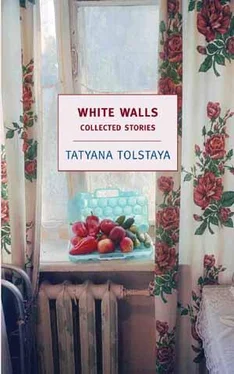or
The long-awaited death of
POPOV
SIMON IVANOVICH
former director of a soft toy factory, came during the night of February 2-3, neither surprising nor upsetting anyone in particular. He’d lived long enough.
Ninety years old, that’s no joke! Whoever wants to show up at the funeral, well, it’ll probably be on Wednesday the sixth, if they deliver the coffins, but then anything can happen here.
or
Noticed to be missing only a week later
POLUEKTOVA
KLARISSA PETRONOVA,
an individual with no particular occupation, born in 1930, a confirmed drunk. Found by her neighbors on the balcony, she gave no signs of life, and she certainly won’t give any now. It’ll happen to all of us one of these days, what can we say? Too bad.
or, finally,
Baby PETER played with matches, Now he’s up in heaven fair, Where bananas grow in batches, Baby PETER, hear our prayer!
Lyonechka was outraged by the narrow-mindedness and callousness of his newspaper colleagues, who didn’t accept his style. He felt that their position was based on poverty of intellect, acceptance of the cliché, lack of inspiration, and persecution of the creative intelligentsia—quite justly, in my view; he deplored their indifference to the Russian word, so powerful and poisonous and yet loving and lithe; he saw their disinclination to expand the limits of genre, and most important—he perceived their dishonesty, their dishonesty and their scorn for the simple, terrifying event that awaits us all, for the trappings of a simple man’s death.
Lyonechka drank tea in my communal apartment kitchen, drawing my neighbor Spiridonov into arguments and shouting matches. Spiridonov had also suffered in the struggle with indifference: the perforated five-kopeck paper piece he invented had cost him an early heart attack, divorce from his wife, expulsion from the Party, and the loss of his illusions. Once a fanatic and now a lifeless, gray-haired man, Spiridonov would show up with tea in a railway tea-glass holder presented to him by his coworkers for his jubilee, set out hard vanilla cookies, and the two of them would grumble and shout at each other. “Dim-witted Hegels… he says to me: Did you substantiate the documentation?… The imagination of a worm… I said, how much metal alone are we throwing under a dog’s tail, these are the Altai Mountains we’re talking about… fly-brains with sclerotic arteries…. All the bus fleets—right? the whole subway— right?” They embraced and cried about all that was pure, fresh, and untarnished, about trust in ideas, love of one’s fellowman, about a simple smile—they cried about a lot of things in those days. Woe is me, oh, ach, alas and alack—as Barkhudarov and Kryuchkov, compilers of a glossary of our native tongue’s sighs, wrote sadly once upon a time. “They’ve done in Pushkin!” Spiridonov shouted ardently: “Ekh, if only Pushkin were here!” “Pushkin will come! We’ll make another Pushkin,” Lyonechka promised.
He laid out his plan to Spiridonov. I’m supposed to be an intellectual, right? said Lyonechka. An intellectual… you know, you’ve seen the posters… the one shown in the back, behind the worker and the peasant woman, wearing glasses just begging to be smashed by, say, a length of pipe or a chunk of cement—the one with a kind of watery, uncertain smile ready to turn into a humiliated smile any second: as if he’s saying, I know, I know my place! The intellectual on the posters knows his place: it’s in the back, in the doorways, at the threshold—and one undrawn foot is already groping backward for the step down, the way back, the path to retreat; that’s the place where they chuck out leftovers, hand-me-downs, scraps, rags, dregs, dribbles, butts, slops, slivers, splinters, mismatches, misreadings, mis-seeings, mis-thoughts. What, you dare to stand up! I’ll teach you! Aha, so you don’t like it… You don’t li-i-i-ke it? Take that, take that, take that! Sic ’im! son of a b—. Now he’s trying to bite, is he?… Look, he’s baring his teeth… he doesn’t li-i-i-ke it. So get the hell outta here! Bastard. Kick ’im, kick ’im out, hey, guys, let’s go, let’s give it to him! Aha, he ran off. Run, run… You won’t get far, ha! And he wanted to talk his way out of it, the louse.
It’s no accident, oh no, it’s no accident that intellectuals are placed in the back on official paintings—posters, that is—it’s not by chance they’re depicted as second-rate, last and least, just like the posters calling for friendship of peoples, by the way, treat black people as second-rate—behind the whites, set back a little. As if to say, friendship is all well and good, but, well, comrades, they’re still black… you know what I mean.
It therefore followed that the intellectual (Lyonechka) and the black (Judy) should be joined in the bonds of matrimony, and this union of the insulted and injured, the wounded and outcast, this minus, multiplied by a minus, would yield a plus—a curly-headed, plump-bellied, swarthy little plus: if our luck holds we’ll get a Pushkin right off; if not, we’ll go at it again and again, or wait for our grandsons, great-grandsons—and going to the grave my blessing will I give!—decreed Lyonechka. “Go for it,” sighed Spiridonov, and left, taking away his jubilee tea-glass holder, on which three silver satellites orbited a pea-sized earth with one lone country on its bulging side.
Lyonechka went for it.
It was the most nebulous possible time for this, it must be said, since it was precisely then that Judy, or whatever her name really was, turned out to have no citizenship status. That is, she simply had no status of any kind—in place of her African homeland a theater of military operations had opened up. One country wouldn’t recognize her, another wanted to expel her, a third invited her to be interned for an indefinite period, and our country exceptionally regretted, shrugged its shoulders, scratched its head, blew the dandruff off its comb, smiled politely, and looked distractedly out the window, but could definitively propose nothing comforting at that given nebulous point. Just be glad it’s no worse.
Aunt Zina, Lyonechka’s aunt, not yet suspecting what a dirty trick her nephew was planning to play on her and her well-being, said to Judy, “Chin up, daughter. Life is hard on everyone.” But her husband, Uncle Zhenya, whose diplomatic career was taking off—and who was expecting appointment to the corner of the African continent opposite Judy’s at any moment, as it so happened—did not approve of contact with the foreign citizen, even though she was homeless. As the hour of the final paperwork on his appointment drew nearer, he became more strict and vigilant, so as not to take a false step in any direction. Thus, he forbade Aunt Zina to subscribe to Novyi Mir, remembering that its poisonous aura had not yet evaporated; he crossed all suspiciously surnamed acquaintances out of his address book, and hesitating, even crossed out a certain Nurmukhammedov (which he bitterly regretted later, when, straining his eyes, he held the page up to the light in an attempt to restore the telephone number, since the guy turned out to be nothing but a car repair swindler); and in the last, crisis-fraught week, he even smashed all the jars of imported food in the house and threw them into the incinerator, including the Bulgarian apple jam, and was already eyeing products from the other republics, but Aunt Zina protected the beet horseradish with her body.
And then, if you please, just as he had brought himself to an unheard of, unbelievable, inhuman ideological purity, just when he virtually glowed, like a good, ripe persimmon—all the pits shine through and there’s not a bruise to be found whichever way you turn it—no, no, no, I am not now nor have I ever been under investigation, I never participated, possessed, belonged, intended, pronounced or met, never even considered, never heard of in my life, never entertained the least thought, never had the foggiest notion; but he rested not day or night, saying: holy, holy, holy Lord God Almighty, Which was, and is and is to come—at this very moment a boy, a snot-nosed boy, his nephew, scientifically speaking, a near relative, sullies, do you understand, his reputation, compared to which the hermits of Mount Athos are simply delinquents, vandals writing indecent words in elevators, mongrels, sorcerers, fornicators, murderers, and idolaters!
Читать дальше












